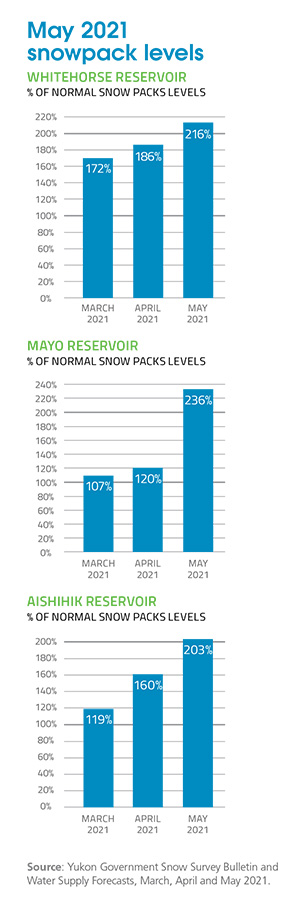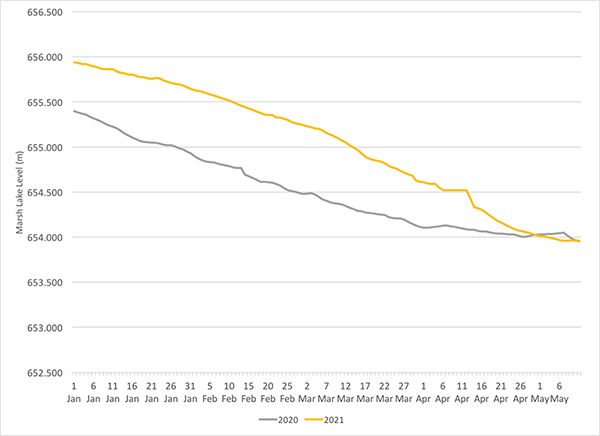May update: Peak water level forecast for Marsh Lake and other hydro basins
News, Media Releases, Environment
May 13, 2021 CommentLots of rain last summer and heavy snowfall this winter has resulted in high snowpack levels in each of the watersheds that feed our reservoirs.
what high snowpack means for water levels
On their own, snowpack levels don’t paint the full picture of how much water will flow into lakes year to year. Rain and glacier melt play important roles too. So does the timing of each of these inflows and the natural limits of how much water can pass through a hydro dam.
forecasted summer peak water levels
Marsh Lake – 656.78 m
- Forecast: Above Full Supply.
- 4 cm lower than the peak water level forecasted in March 2021.
- 56 cm lower than peak water levels during the 2007 flood.
- Comparable to peak water levels in 2004.
Mayo Lake – 665.84 m
- Forecast: At Full Supply.
Aishihik Lake – 915.16 m
- Forecast: At Full Supply
what we have done to draw down Marsh Lake
Since March, our inflow model has forecasted that water levels on Marsh Lake will be higher than normal this summer. Because of that, we have taken the following steps to increase flows through the Whitehorse Rapids Generating Station and to lower levels on Marsh Lake:
- Opened up the gates at the Lewes River Control Structure. All 30 gates at the Lewes River Control Structure have been open since March 19, 2021.
- Gradually lowered water levels on Schwatka Lake by 95 cm to increase water flows through Miles Canyon. Our water use licence only allows us to lower Schwatka Lake by 1 m.
- Opened the boat lock at the Lewes River Control Structure.
Since March 1, 2021, we have drawn down Marsh Lake by more than 1.25 metres, and to levels comparable to this time last time.
Our inflow model suggests that water from the spring melt (also known as freshet) started to enter Marsh Lake around May 7 this year, about two weeks earlier than normal.
Our actions so far have helped to limit how much Marsh Lake has risen since freshet, but residents in the Southern Lakes area can expect to see water levels slowly start to rise again in the coming weeks.

changes this summer
Throughout the summer, we’ll continue to do what we can to keep flows through the Whitehorse dam high and levels on Marsh Lake as low as possible. The boat lock will remain open this summer. Small watercraft wanting to pass by the Lewes River Control Structure will need to portage around the structure. Lake levels on Schwatka Lake will also remain at reduced levels throughout the summer. Some docks may need to be lowered to allow users to access floatplanes on the lake.
update on our water use licence
On April 28, 2021, the Yukon Water Board approved our application for an emergency amendment to our Whitehorse Rapids Generating Station water use licence. The amendment allows us to draw down Marsh Lake 10 cm below the permitted Low Supply Level this year, with conditions that we monitor and report back on how the environment responded to the lower lake level.
Unfortunately, because of the early freshet and with water from the spring melt already entering Marsh Lake, it’s unlikely that we will be able to reach this new reduced level this spring.
looking ahead
Over the next several months, we’ll keep a close eye on lake levels on Marsh Lake and downstream of the dam. We will also continue to work with Yukon government’s Water Resources Branch and Emergency Measures Organization (EMO) to assess water levels and to share information with the public.
Comments
Be the first to comment